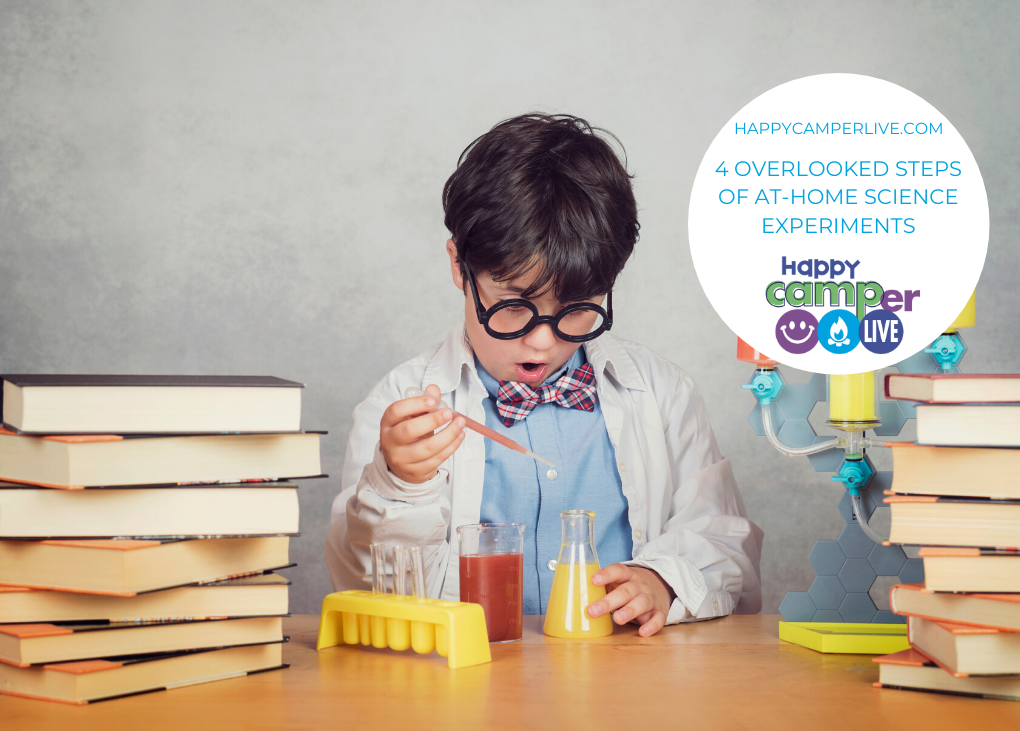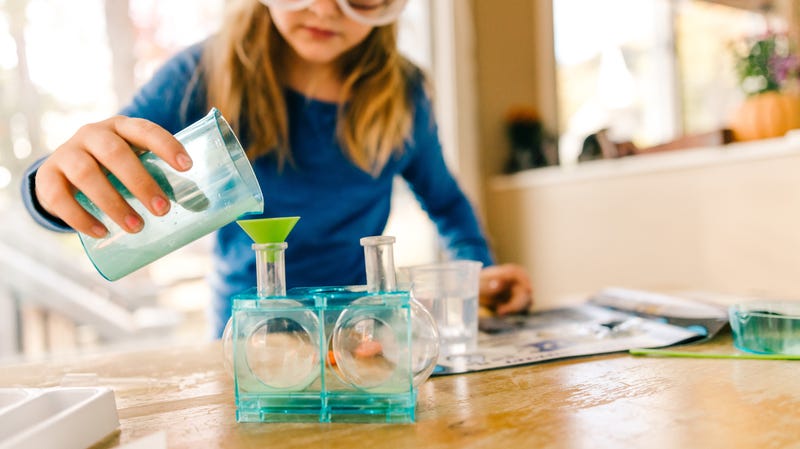
Activities
Family activities
Science
4 Overlooked Steps of At-Home Science Experiments
Written By: happycamperThere are a number of fun activities that you can do from the comfort of your own home, and some of them are even educational. Take science experiments, for example. Not only are they exciting and interactive, but they also help us understand the world we live in. Science experiments are a great way for campers to learn about a new field of knowledge while having tons of fun along the way!
But as fun as science experiments can be, it’s common to rush through the process in order to get to the fun part. Here are 4 overlooked steps that are essential for a successful science project:

Here are a few steps to help your at-home science project go smoothly:
Do your research and pick the right experiment
There are so many interesting science experiments that you can choose to do, but make sure you know what you’re getting into. The best way to make an informed decision about the best type of science experiment for you is to do plenty of research. Spend some time researching what materials are required, how many people are needed to safely do the experiment, and what kind of reaction to expect.
For example, if you’re doing the experiment with younger campers, avoid dangerous chemicals, sharp objects, and explosive reactions. Although these types of experiments are often the most thrilling, they can be unsafe for campers who don’t have experience with hands-on projects. Simpler experiments, like building a snow globe or bowl of slime, are still very exciting and highly informative.
On the other hand, some science experiments can be too simple for older campers. These experiments are often boring and a poor use of time. Campers with a fundamental understanding of basic scientific concepts should challenge themselves to try experiments that will expand their knowledge. As long as they are aware of the safety guidelines, older campers can work with complex experiments like making a carbon sugar snake or building a lava lamp.
It’s worth it to put in the extra time to find an experiment that’s perfect for YOU! For some great project ideas, click here, or visit the Happy Camper Live website for more information.
Gather the materials well ahead of time

Once you’ve decided on an experiment, you’ll need to gather your materials. Most materials are always in stock at local grocery and craft stores, but some specialty items may only be available online. Depending on the type of experiment, goggles and/or gloves may be necessary. Err on the safe side by purchasing more safety materials than you need. Better safe than sorry!
In addition, experiments that involve chemical reactions often require specific chemicals that can only be found online and take weeks to arrive. Gather your materials days in advance so you’re not scrambling at the last minute. After all, science experiments should be fun, not stressful.
Be prepared for a mess
When it comes time to do the experiment, it’s common to forget about the aftermath. Don’t make the mistake of getting glue stuck in the carpet or spilling chemicals on your furniture. Find a space where you won’t mind making a mess – backyards, driveways, and garages work great. It’s sometimes helpful to layout a tarp or disposable mat underneath the table you’re working on. Avoid bringing any food or drink to your workspace – not only is it a distraction, but it’s unsafe to eat and drink when working with science materials. Following these simple precautions will make your experience so much better.
But sometimes it’s not possible to avoid making a mess, so you should be prepared for the worst. Keep soap and bleach on hand to remove stains and plenty of paper towels to sop up liquid. Of course, if you spill any chemicals, immediately dispose of the materials used to clean them up.
Understand the science behind the results
Unfortunately, this is a step that is skipped too often, even though it may be the most important.
After you’ve completed the experiment, you need to try to understand what happened. Talk about which materials worked together to produce the exciting results, and why each material was necessary for the project. Read an article or watch a YouTube video where the science behind the experiment is explained. Ask and answer questions about what you just saw. Understanding what happened is a valuable part of the process that emphasizes the awesome aspects of nature and science, and makes the whole experience educational and worthwhile.
Remember these simple steps, and you’re sure to have a great science experiment! Good luck!
Tagged:- activities for kids, activities for kids to try at home, science camp, science experiments for kids, summer camp activities
RELATED ARTICLES

Activities
Family activities
Winter Camp Activities to Keep Kids Active Indoors
When winter weather keeps campers inside, staying active can feel like a challenge—but indoor camp activities can be just as energizing, creative, and fun. With the right mix of movement, teamwork, and imagination, indoor winter camp activities help kids burn energy, build skills, and stay engaged even when it’s cold outside. Below are high-energy indoor […]
Activities
Campers
Why Winter Is the Perfect Time to Introduce Kids to Camping Skills
When most families think about camping, summer instantly comes to mind—long days, warm nights, and campfires under the stars. But winter offers a unique (and often overlooked) opportunity to introduce kids to essential camping skills in a low-pressure, creativity-filled way. With fewer distractions and more time indoors, winter is actually the perfect season to help […]
Read More...
Activities
Outdoor adventure
New Year, New Adventures: Outdoor Skills Kids Can Practice in Winter
The New Year is the perfect time to try something new—and winter offers its own exciting outdoor classroom for kids. While summer may be camp season, winter is ideal for building confidence, creativity, and practical outdoor skills that kids can practice right in their own backyard or at a winter camp. From snow science to […]
Read More...
Activities
Arts and crafts
Winter-Inspired Arts and Crafts for Campers
Winter is the perfect season to slow down, get creative, and explore arts and crafts inspired by snowy landscapes, cozy traditions, and winter wildlife. Whether campers are spending time outdoors at winter camp or staying warm inside, winter-themed crafts help build creativity, fine motor skills, and a sense of seasonal wonder. Below are fun, age-appropriate […]
Read More...
Activities
Campers
Parents
How Camps Can Help Kids Set Goals and Build Confidence in the New Year
The start of a new year is a powerful moment for reflection, fresh starts, and growth—especially for kids. While adults often focus on resolutions, children benefit most from environments that encourage progress through experience, play, and positive reinforcement. That’s where camp shines. Camps provide a unique setting where kids can set goals, try new things, […]
Read More...
HAPPY CAMPERS
4 Ideas For Hosting a Claw-some Dance Party Playdate
Read More...
6 Clever Variations on Outdoor Camp Games
Read More...
7 Easy Fall Treats For Kids
Read More...
4 Quick and Easy Tennis Ball Games
Read More...
categories
Activities (279)
Arts and crafts (85)
Camp stories (12)
Camp traditions (24)
Campers (107)
Cooking (50)
Education (6)
Family activities (93)
Featured camps (12)
Gift Guides (12)
Music (9)
Outdoor adventure (44)
Parents (65)
Podcast (25)
School (17)
Science (16)
Sports (32)
STEM (13)
Water sports (1)


